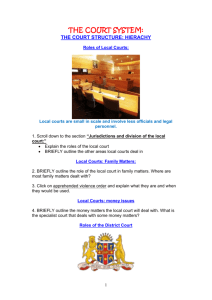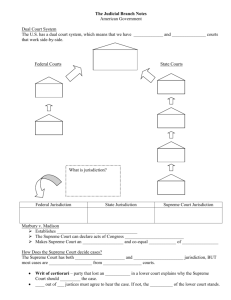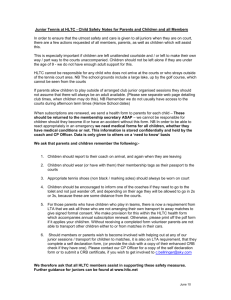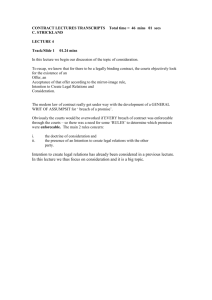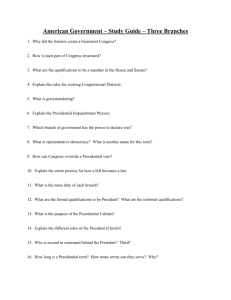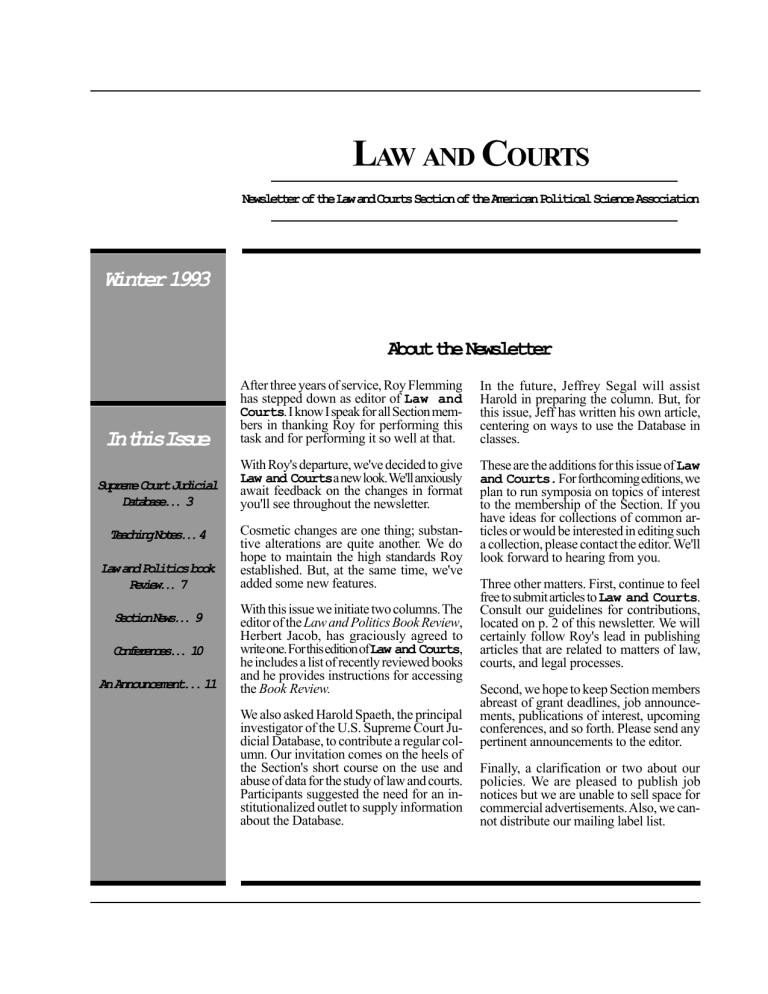
LAW AND COURTS
Newsletter of the Law and Courts Section of the American Political Science Association
Winter 1993
About the Newsletter
InthisIssue
After three years of service, Roy Flemming
has stepped down as editor of Law and
Courts. I know I speak for all Section members in thanking Roy for performing this
task and for performing it so well at that.
In the future, Jeffrey Segal will assist
Harold in preparing the column. But, for
this issue, Jeff has written his own article,
centering on ways to use the Database in
classes.
Supreme Court Judicial
Database... 3
With Roy's departure, we've decided to give
Law and Courtsa new look. We'll anxiously
await feedback on the changes in format
you'll see throughout the newsletter.
These are the additions for this issue of Law
and Courts. For forthcoming editions, we
plan to run symposia on topics of interest
to the membership of the Section. If you
have ideas for collections of common articles or would be interested in editing such
a collection, please contact the editor. We'll
look forward to hearing from you.
TeachingNotes...4
Law and Politics book
Review... 7
SectionNews... 9
Conferences... 10
An Announcement... 11
Cosmetic changes are one thing; substantive alterations are quite another. We do
hope to maintain the high standards Roy
established. But, at the same time, we've
added some new features.
With this issue we initiate two columns. The
editor of the Law and Politics Book Review,
Herbert Jacob, has graciously agreed to
write one. For this edition of Law and Courts,
he includes a list of recently reviewed books
and he provides instructions for accessing
the Book Review.
We also asked Harold Spaeth, the principal
investigator of the U.S. Supreme Court Judicial Database, to contribute a regular column. Our invitation comes on the heels of
the Section's short course on the use and
abuse of data for the study of law and courts.
Participants suggested the need for an institutionalized outlet to supply information
about the Database.
WINTER 1993
Three other matters. First, continue to feel
free to submit articles to Law and Courts.
Consult our guidelines for contributions,
located on p. 2 of this newsletter. We will
certainly follow Roy's lead in publishing
articles that are related to matters of law,
courts, and legal processes.
Second, we hope to keep Section members
abreast of grant deadlines, job announcements, publications of interest, upcoming
conferences, and so forth. Please send any
pertinent announcements to the editor.
Finally, a clarification or two about our
policies. We are pleased to publish job
notices but we are unable to sell space for
commercial advertisements. Also, we cannot distribute our mailing label list.
1
interested in editing a collection of common articles. Symposia submissions
should follow the guidelines for other
manuscripts.
GeneralInformation
Law and Courts publishes articles, notes,
news items, announcements, commentaries, and features of interest to members of
the Law and Courts Section of the American Political Science Association. Law and
Courts is published three times a year in
Winter, Spring, and Summer issues. Deadlines for submission of materials are: November 1 (Winter), March 1 (Spring), and
July 1 (Summer). Contributions to Law
and Courts should be sent to:
Instructionsto
Contributors
Announcements, Correspondence, and
Bibliographies
Announcements and section news will be
included in Law and Courts, as well as information regarding upcoming conferences. Organizers of panels are encouraged to inform the editor so that papers
and participants may be reported. Developments in the field such as fellowships,
grants, and awards will be announced if
there is sufficient time for submission of
materials to the granting or awarding body.
Finally, authors of judicial books should
inform Law and Courtsof their manuscript's
publication.
Lee Epstein, Editor
Law and Courts
Department of Political Science
Washington University
Campus Box 1063
One Brookings Drive
St. Louis, MO 63130
Phone: (314) 935-8580
FAX: 314/935-5856
E-MAIL: C38ø54LE @ WUVMD
Data and Analysis Information
Articles, Notes, and Commentary
Law and Courts wishes to keep the Section
informed about the availability of datasets
of interest to the field. This includes newlyarchived datasets held by the Consortium,
as well as non-archived ones that individual researchers would like to share with
their colleagues. Special analysis and data
problems or queries of interest to the field
will also be published. Send suggestions
or information to the editor.
Brief articles and notes describing matters
of interest to the field will be published
subject to review by the editor. Authors
are encouraged to share research findings,
teaching innovations, or commentary on
developments in the field, which would
interest members of the Section.
Footnote and reference style should follow that of the American Political Science
Review. Please submit two copies of the
manuscript, with an abstract of 150 words
or less. If possible, also enclose a diskette
containing the contents of the submission.
In a cover letter, provide a description of
the disk's format (for example, DOS,
MAC) and of the word processing package used (for example, WORD,
Wordperfect).
Executive Committee of the
Law and Courts Section
Chair: Lynn Mather
Chair-Elect: Martin Shapiro
Secretary/Treasurer: Judith Baer
Executive Council: Susan Burgess,
Micheal Giles, Charles Lamb, and
Susan Gluck Mezey
Symposia
Collections of related articles or notes are
encouraged. Please contact the editor if
you have ideas for symposia or if you are
2
LAW
AND
COURTS
Supreme Court Support for Civil Liberties Claims, 1953-1991
% Support for Civil Liberties
90
80
70
60
50
40
30
20
10
1952
1962
1972
1982
1992
Term
Source: U.S.SupremeCourtJudicialDatabase,withorallyarguedcitationastheunitofanalysis.
U.S. Supreme Court Judicial Database: An Update
HaroldJ.Spaeth,MichiganStateUniversity
As a result of user requests, I have advanced the date for the release of the 1992
term of the Database. Previous editions
were not sent to the Inter-University Consortium in Ann Arbor until I had received
complete data from the Court's last term.
Because I code the data from the Advanced Sheets of the Lawyers' Edition of
the United States Reports, coding was not
complete until the middle of December.
This new policy, which will also govern
future editions, should put the preceding
term's data in the Consortium's hands by
the end of August. Hopefully, this will
enable the Consortium to make the data
available to users before Thanksgiving.
Advancing the date at which the Consortium receives the last term's data will entail no appreciable loss of information.
Advance Sheet subscribers receive the issue containing the last cases decided prior
to the adjournment about a month later—
in late July or early August. Although I
promptly read and code these decisions
on receipt of this issue, I have not immediately sent the new dataset to
WINTER 1993
Ann Arbor because the Court typically decides a few matters summarily between adjournment and the beginning of the next term
on the first Monday in October that contain
opinions. Typically, these are requests for
stays of execution in which one or more of
the justices on the losing side states his or
her objections.
My only excuse for not accelerating the compilation of the last term's decisions was attachment to completeness. But inasmuch as
these post-adjournment decisions generate
little interest, and their exclusion until the
next year's editions does not burden compilation or transmission of the data, it serves
no useful purpose for me to continue to adhere to my original practice, given user requests for an abbreviated turnaround.
Because I have no control over the time the
Consortium takes to make the datasets it receives available to users, and because I did
not accede to user requests for earlier release
until mid-October, I do not know when the
(continued on the next page)
3
U.S. Supreme Court Judicial Database: An Update (continued)
1992 term edition will be available. I certainly hope by January 1. Incidentally, this
edition will contain complete data on Justice White who retired at the end of the 1992
term after 31 years on the Court. White is
the eleventh justice for whom the database
contains complete data. (The others are
Brennan, Burger, Fortas, Goldberg, Harlan,
Marshall, Powell, Stewart, Warren, and
Whittaker.)
On a related matter, I urge users to acquire
a copy of the current edition of the data even
if their research interests predate the 1992
term. The Consortium annually receives an
entire new set of data from the beginning
of the Warren Court in 1953 through the
Court's last term. As a result, any errors of
commission or omission that were belatedly discovered since the previous year's
edition are corrected. And though these errors will not appreciably affect users' findings, interest in accuracy warrants use of
the current edition. The codebook is also
updated annually, not only to include a code
for the Court's most recent term, but also
the end or beginning of a new natural Court,
the presence of a new justice, and the addition of new variables, if any. The first page
of the current codebook specifies the
changes and improvements that have occurred since the previous year.
As always, I invite comments, criticisms,
and corrections from users and potential
users.
Harold J. Spaeth is Professor of Political
Science at Michigan State University and
is principal investigator of the Supreme
Court Database. His address is Department
of Political Science, Michigan State University, East Lansing, MI 48824. Phone
(517) 355-6583; E-mail 03369HJS@ MSU.
Teaching Supreme Court Decision Making on the Computer
JeffreyA.Segal,SUNY—StonyBrook
For the past two semesters I have been
teaching an undergraduate course that examines Supreme Court decision making
though several computer databases on the
Court. Because I love teaching the course
and many (though not all—more on that
later) of my students really enjoy taking it,
I thought I would inform Section members
about it.
This is a wonderful course to teach and for students it can be a
terrific course to take. An obvious advantage...is the computer
literacy that they develop.
This course is really two courses in one.
On Tuesdays we meet in a regular classroom and have lectures/discussions on that
week's substantive readings. On Thursdays
we meet in a computer classroom and learn
about the Court on the computer.
There is no prerequisite for the course in
terms of computer skills, but the students
4
LAW
AND
have met the department's one-semester
methods requirement before taking the
course. (This does not guarantee that the
students actually recall any statistics. Some
have a vague recollection that regression
has something to do with a line, while others may recall that the number ".05" is
somehow related to a concept called "statistical significance.") I do not teach statistics in the class but I do give a non-technical conceptual review of whatever statistics we cover.
For the Tuesday class I use Baum's The
Supreme Court and Segal and Spaeth's The
Supreme Court and the Attitudinal Model.
Although I cannot claim objectivity about
the use of the books for the course, there is
one advantage to Segal and Spaeth: it relies heavily on the Supreme Court Judicial
Database. This makes the connections between the Tuesday lectures and the Thursday computer work much more apparent.
I use several different datasets for the course
COURTS
There is no doubt in my
mind: this level of work
is not beyond the
capabilities of undergraduates if they simply
put in the effort.
including Spaeth's database, which is
available through the ICPSR. To keep
within disk space allocated for classroom
use I edit the database to exclude
ANALUs, DEC-TYPEs, and variables
that are infrequently used. I end up with a
database about one-third the size of the
original with little sacrifice in terms of
what is needed for classroom purposes.
Proprietary databases include the following: a survey I have the students conduct
on public opinion toward the Court (see
below); a database on the characteristics
of Supreme Court nominees since Earl
Warren, which includes such variables as
the nominees' perceived Ideology and
Qualifications, the amount of Senate Opposition, and their Voting in Civil Liberties cases; and databases on individuallevel senate voting in the Fortas, Bork, and
Thomas nominations. I will be glad to send
these files over bitnet or internet to people
interested in teaching such a class.
The computer classroom that I use for
Thursday class currently consists of
twenty-four 386-DX computers. Because
the database I use is quite large, we do all
of our computing on the University's IBM
mainframe using SPSS. (The classroom
is being upgraded to 486-DX machines.
When that is complete I plan to switch to
SPSS for Windows.) I begin with three
weeks of introduction to the mainframe
and the CMS operating system. While we
are covering these basics I have the students conduct a survey (five subjects per
student) on attitudes toward the Supreme
Court. The students enter the responses
into the computer and, with my help, they
merge their individual files into a single
dataset. This is a crucial first project because it lets students know where data
come from and that numerals in databases
do in fact represent something real.
When the survey is compiled into a single
file the students are ready to start learning
SPSS. We put in the data list, variable and
value labels, begin data, and end data commands. While we are doing this in class
the students are reading the appropriate
pages in the SPSS Guide to Data Analysis
by Norusis.
By week five the students begin learning
SPSS commands at a rate of one or two
WINTER 1993
per week: frequencies, crosstabs, t-tests, chisquare, correlation, regression and even logistic regression. I usually tie the computer
lessons into whatever subject we covered
that Tuesday in class. For example, when
we cover appointments, they use my confirmation database to examine the effects of
partisanship on confirmation voting.
Grading in the course is based on a substantive midterm and final, an open-book computer practicum, a computer-based term paper (where students test a hypothesis of their
own choosing), and weekly homework assignments. The homework assignments typically include answering syntax and conceptual questions from the Norusis book and
completing a computer analysis. The
homeworks, though worth only 10 percent
of the final grade, are crucial to success in
class. Students who hand in the homeworks
invariably get As or Bs; students who don't
do them invariably fail. There is no doubt in
my mind: this level of work is not beyond
the capabilities of undergraduates if they
simply put in the effort.
I strongly recommend the use of graduate
or undergraduate teaching assistants. While
I am demonstrating computer use on the projector there are always some students who
did something wrong. If I had to stop the
class to help each time this happened nothing would ever get done. The first time I
taught the course I had one graduate T.A.;
the second time I used two undergraduates
who had done well in the class. Both systems worked out fine.
This is a wonderful course to teach and for
students it can be a terrific course to take.
An obvious advantage to the students is the
computer literacy that they develop. Most
important is the feeling of satisfaction they
receive when they realize that they can ask
and answer social science questions without needing to rely on what is published in
books. That they can produce knowledge,
and not just consume it, had probably never
occurred to them before.
Jeffrey A. Segal is Professor of Political Science at SUNY-Stony Brook. For a copy of
his syllabus, write to him at: Department of
Political Science, SUNY-Stony Brook, Stony
Brook, New York 11794-4392.
5
During the more than twenty years in which I have taught law-related courses to undergraduates, I have consistently experienced a tension between the need to introduce students to the structure and processes of legal institutions and the desire to introduce them
to the broader themes (e.g., independence versus accountability) which link the study of
law to the liberal arts tradition. Obviously both of these subjects are important. We can
scarcely count our work as teachers fulfilled if students complete their coursework without some understanding of the institutional structure of the legal system. On the other
hand, the ability to trace the federal court structure from the District Courts to the Courts
of Appeals to the Supreme Court is relatively sterile knowledge without an idea of the
role which courts have played in American political life. Moreover, these two types of
information are more often than not interrelated. Understanding the importance and prominence of the U.S. Supreme Court, for example, depends in no small part on understanding where it sits in the overall structure of American courts. While we can agree that
students need to be introduced both to the structure and the processes of the legal system
and to the broader value themes which it subsumes, a tension arises in implementing this
goal within the reality of a finite classroom time. One approach to alleviating this tension
is to place greater responsibility on students to acquire information outside the classroom setting. Traditionally, this has been accomplished through assigned readings. With
support from the Commission on College and University Nonprofessional Legal Studies
of the American Bar Association and of the Information and Technology Division of
Emory University, John Hermann and I have developed computer courseware designed
to provide an out-of-class review of the Federal Court System.
More on Teaching about Law. and Courts...
A Computer Assisted Review of the Federal Court System: "Courseware"
MichaelW.Giles,EmoryUniversity
The courseware covers two topics. First, it provides an overview of the history and
development of the Federal Courts. This section draws directly on Russell Wheeler and
Cynthia Harrison's "Creating the Federal Judicial System," a 1989 publication of the
Federal Judicial Center. A series of historical maps of the structure of Federal courts are
presented with textual information available to the student on request. Second, the
courseware provides a brief description of each type of court in the Federal system. A
diagram of the court structure is provided and students are able to obtain detail on each
court by "pointing and clicking" on the court's position in the structure.
A copy of the courseware can be obtained by making a request to me either in writing
(Department of Political Science, Emory University, Atlanta, GA 30322) or electronically (POLSMG @ EMUVM1). There is no charge to receive a copy. The courseware
can be duplicated by the user for use in conjunction with a class. Users are requested to
send suggestions for additions and/or enhancements to the courseware, as well as to
report any glitches they encounter. The courseware runs on Apple MacIntosh equipment
and require the user to either have Hypercard or Hypercard Reader installed. The
Hypercard stack takes 644K of storage space
Micheal W. Giles is Professor of Political Science at Emory University.
6
LAW
AND
COURTS
Law and Courts Book Review and Other Electronic
Resources
HerbertJacob,NorthwesternUniversity
With the Section's support, The Review
began publishing in March, 1991. In the
two-and one-half years since then, we have
reviewed more than 150 books in addition to 13 constitutional law case books
and two review essays. Over 125 persons
have written reviews; most have been political scientists although I have also drawn
from the ranks of historians, sociologists,
anthropologists, and law school academics.
The Review now has over 700 subscribers
in at least 13 countries. Those who subscribe (at no fee) receive each review in
their e-mail box as soon as it is published.
It is quite simple to subscribe. If one is on
e-mail (Internet, Bitnet, or a commercial
service such as Compuserve), one simply
sends the message: SUBSCRIBE PSRTL [YOUR NAME] to LISTSERV @
MIZZOU1.MISSOURI.EDU.
It is quite simple to subscribe... Send the message:
SUBSCRIBE PSRT-L [yourname] to LISTSERV
We try to review all first edition books that
might be of interest to members of the Section. The main difficulty in achieving that
goal is obtaining books from publishers.
Some routinely send us relevant books or
catalogs from which to order new books; I
also scan advertisements and rely on my
editorial board and on word of mouth to discover books that we should review. Between
August 1 and October 15, we published the
following reviews:
Recently Reviewed Books
Mary Volcansek, Judicial Impeachment:
None Called for Justice. Urbana, IL;
University of Illinois Press, 1993.
Reviewed by Robert Carp (University
of Houston).
Jerome H. Skolnick and James J. Fyfe,
Above the Law: Police and the Excessive Use of Force. New York: Free
Press, 1993.
Reviewed by Stuart Scheingold (University of Washington).
Charles Humana (ed.), World Human
Rights Guide. New York: Oxford University Press, 1992.
Back issues may be accessed at several
addresses on the Internet. The easiest and
most complete source for back issues is
the Northwestern University gopher (see
below).
WINTER 1993
Reviewed by Cecelia Lynch (Northwestern University).
(continued on the next page)
7
Law and Courts Book Review (continued)
Cass R. Sunstein, The Partial Constitution.
Cambridge: Harvard University Press,
1993.
Reviewed By Gregg Ivers (American
University).
Larry D. Barnett, Legal Construct, Social
Concept: A Macrosociological Perspective on Law. New York: Aldine de
Gruyter, 1993.
Reviewed by Lawrence Friedman
(Stanford Law School).
Barbara Hinkson Craig and David M.
O'Brien, Abortion and American Politics. Chatham, NJ: Chatham House,
1993.
Reviewed by Susan Gluck Mezey
(Loyola University).
Jeffrey A. Segal and Harold J. Spaeth, The
Supreme Court and the Attitudinal
Model. New York: Cambridge University Press, 1993.
Reviewed by Brad Canon (University
of Kentucky).
law and courts field. It presently includes
some papers presented at the APSA and
IPSA meetings this year and will include
papers from other regional and national
meetings. I welcome additional papers
which should be sent to me on disk as a
DOS Wordperfect or ASCII file. Please use
only endnotes and remove all graphics
since they will not transmit in ASCII form.
In addition, a very comprehensive set of
data sources on the Internet is now available on the Northwestern University gopher. You may obtain back issues of the
book review, the preprints, as well as Supreme Court cases, state laws, Bureau of
Justice Statistics documents, and access to
other legal gophers.
You need only have a gopher client on your
PC or at your computing center. Simply
connect to gopher.nwu.edu. You will see a
menu of items; select Networked Resources, by Discipline. This brings you to
another menu; select Political Science. On
the next menu, select Judicial Branch.
There you will find the items listed above
except the preprints. Choose Electronic
Texts and Journals to find the preprints. In
addition, you can indulge yourself in the
many other data sources on this gopher.
A Reply to Professor Canon's Review of Segal and Spaeth's The
Supreme Court and the Attitudinal Model by Timothy M.
Hagle (University of Iowa).
Sally J. Kenney, For Whose Protection?
Reproductive Hazards and Exclusionary Policies in the United States and
Britain. Ann Arbor: University of
Michigan Press, 1992.
Reviewed by Judith A. Baer (Texas A
& M University).
Other Electronic Resources
Two new electronic services are now available. The first is a preprint archive in the
8
LAW
AND
Herbert Jacob is Professor of Political Science at Northwestern University and editor of The Law and Politics Book Review.
His address is Department of Political Science, Northwestern University, Evanston,
IL 60208. Phone (708 491-2648. E-mail
mzltov @ nwu.edu.
COURTS
Section News
Newly Elected
Officers
At the 1993 meeting of the Law and Courts
Section, held during the American Political Science Association conference in
Washington, D.C., members elected the
following new officers:
Martin Shapiro, Chair
Judith Baer, Secretary/Treasurer
Section Awards
Membership
Directory
Editor
Lynn Mather is the current chair of the Section. Members of the Executive Council
are:
Susan Burgess
Micheal Giles
Charles Lamb
Susan Gluck Mezey
At its 1993 annual meeting, the Section
announced the following awards:
Faculty Paper Award
Lifetime Achievement Award
Mark Graber, University of Maryland, "The
Non-Majoritarian Difficulty: Legislative
Deference to the Judiciary."
Henry J. Abraham, University of
Virginia
C. Herman Pritchett Book Award
Elliot Slotnick and Jennifer Segal, Ohio
State University, "Television News and the
Supreme Court" (runner up).
H.W. Perry, Harvard University, Deciding
to Decide (Harvard University Press).
Student Paper Award
Herbert M. Kritzer, University of Wisconsin, Madison, Let's Make a Deal (University of Wisconsin Press).
Julie Novkov, University of Michigan, "Toward a Racist Theory of the State: PostCivil War Anti-Miscegenation Prosecutions."
The Law and Courts Section seeks applications for the position of editor of its
Membership Directory. The job entails
revising and updating the existing directory.
Information contained in the current directory includes: academic ranks, affiliations, postal addresses, phone and fax
numbers, e-mail addresses, and areas of
interest.
WINTER 1993
Interested persons should contact:
Professor Lynn Mather
Department of Government
Dartmouth College
Hanover, NH 03755
Phone: (603)646-2693
Fax:
603/646-2152
Bitnet: LYNN.MATHER @
DARTMOUTH.EDU
9
Conference Schedule, 1994
Western Political Science Association
Southwestern Political Science Association
Midwest Political Science Association
Law and Society Association
International Political Science Association
American Political Science Association
Southern Political Science Association
Albuquerque, New Mexico
San Antonio, Texas
Chicago, Illinois
Phoenix, Arizona
Berlin, Germany
New York, New York
Atlanta, Georgia
March 10-12, 1994
March 30-April 2, 1994
April 14-16, 1994
June 16-19, 1994
August 21-25, 1994
September 1-4, 1994
November 2-5, 1994
CallsforPapers
Law and Society Association
The Law and Society Association has issued a Call for Participation for its 1994
Annual Meeting to be held June 16-19 at
the Arizona Biltmore Resort in Phoenix,
Arizona. The theme of the meeting is "Cultural, National and Transnational Legalities:
Contested Domains." Proposals are welcome for presentation and discussion of all
aspects of research on topics that link law
and society, in the broadest sense of these
terms. The due date for proposals is December 20, 1993. Late proposals will be
considered on a space available basis. For
a copy of the Call contact: Law and Society Association, Executive Offices, Hampshire House-Box 33615, University of Massachusetts, Amherst, MA 01003-3615
USA. Phone: (413) 545-4617; FAX: 413/
545-1640; E-mail: lsa @ legal.umass.edu.
LSU-S, Bronson Hall 451, One University Place, Shreveport, LA 71115-2301.
Franklin D. Roosevelt Conference: 50
YearsAfter
Editor for the special issue will be Samuel
Krislov, University of Minnesota, and Associate Editor will be Doris Marie Provine,
Syracuse University. Donald Kommers, the
regular editor-in-chief of The Review, will
function as representative of the journal in
the selection process of the articles and
overall coordination of the issue with The
Review.
Louisiana State University in Shreveport
will hold its second conference in a series
on great American presidents. FDR After
50 years, a three-day program, is scheduled for Thursday-Saturday, 14-16 September 1995. All topics considered. Though the
deadline for submitting proposals is October 1, 1994, early submission is strongly
recommended. The Selection Committee
makes decisions on a rolling basis. For
those interested in presenting papers, chairing panels, or observing the conference,
please contact: William D. Pederson, History and Social Science Department,
10
LAW
AND
TheReviewofPolitics
The Law and Courts section of the American Political Science Association and The
Review of Politics are entering the third year
of a joint effort to publish a summer issue
of The Review focused on judicial process,
legal theory, and judicial behavior. The
Review has achieved a particularly strong
reputation through the years in the areas of
constitutional theory and jurisprudence, and
these topics will continue to be of great interest but broader topics and concerns are
also encouraged, especially in accordance
with the focus of the Law and Courts Section.
Submissions should meet The Review of
Politics standards and stylesheet and four
copies should be sent to The Review of
Politics, Box B, Notre Dame, Indiana
46556. Authors who wish to publish in the
special issue should so indicate. Manuscripts intended for the special issue should
be submitted prior to February 1, 1994.
COURTS
Reaching Those Who Teach Teachers
Defining the Core of Constitutionalism, Citizenship, and Civic Education
A Summer Institute for College and University Faculty
June 12-July 19, 1994 at the University of Tulsa
The summer institute, a project of the American Political Science Association and the University of Tulsa,
is supported by a major grant from the National Endowment for the Humanities
The Program
An
Announcement
The summer institute is an innovative effort to tackle the problem of how to enhance the quality of teaching
about constitutionalism, constitutional history, civic education, and citizenship for college students who
will enter the ranks of the teaching profession. Seminar topics include: "The Nature of American Constitutionalism," "The Colonial and Early American Background of the Constitution and the Bills of Rights,"
"The Scope of Individual Rights," "The Guarantees of Equal Rights and Liberties to All Americans," and
such other topics as freedom of expression and separation of church and state. The institute addresses these
topics by concentrating on both content and pedagogy, exploring the various ways in which the central
messages of the history of the Constitution and constitutionalism can be most effectively presented in order
to heighten understanding about citizenship.
The Faculty
Institute Director: Kermit Hall, Dean Henry Kendall College, University of Tulsa
Guest Faculty: Herman Belz, University of Maryland; Lief Carter, University of Georgia; Donald S. Lutz,
University of Houston; Sandra F. VanBurkleo, Wayne State University
Participant Eligibility
The institute seeks applications from teams of college faculty drawn from history, political science, and
social studies education. Each team should include two persons, one of whom must be s social studies
education professor accompanied by either a historian or political scientist from the same institution. The
faculty teams will be responsible for developing and coordinating the content and methodology of courses
designed in their institutions to prepare pre-collegiate teachers to teach American history, civics, and government. Applications will also be considered from individual faculty who are committed to strengthening
the training of pre-college teachers and will work with colleagues at their institutions after the summer
institute to do so.
Participant Stipends
Participants will receive funds for travel to and from the institute, for room and board, and a stipend of
$1,125.
Application Procedures
Faculty applying as a team should send a joint letter of application accompanied by each applicant's resume. The letter should indicate which courses offered by the faculty are required or recommended to
students who will be teachers and how the faculty believe the institute can contribute to the design of
courses and to coordinating teacher training. Individual applicants should also send a resume and letter
with the same information as well as description of how they expect to work with colleagues responsible
for teacher education to adapt materials from the summer institute in their institution's courses for future
teachers.
Application deadline is March 1, 1994. Applications and inquiries should be directed to: Summer Institute/Constitutionalism, APSA, 1527 New Hampshire Avenue, NW, Washington, DC 20036. Fax: (202)
483-2657. Telephone: (202) 483-2512.
WINTER 1993
11
Law and Courts is the newsletter of the Law and Courts Section of the
American Political Science Association. Copyright 1993, American Political Science Association. All rights reserved. We gratefully acknowledge the support of Washington University in helping to defray the editorial and production costs of the newsletter.
Subscriptions of Law and Courts are free to members of the APSA's Law
and Courts section. Please contact the APSA to join the Section.
Submissions to Law and Courts are welcome. The deadline for submissions for the next issue is March 1, 1994.
Law and Courts
Non-profit Organization
U.S. Postage
PAID
Permit No. 215
College Station, TX
Department of Political Science
Texas A & M University
College Station, Texas 77843-4348
12
LAW
AND
COURTS



